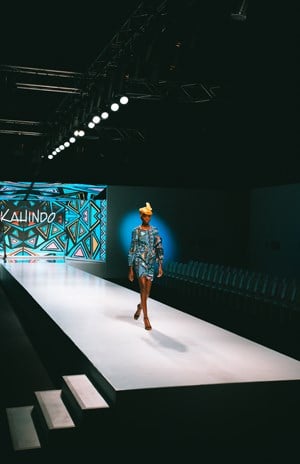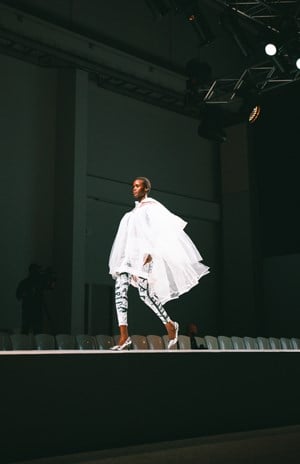
Subscribe & Follow
Jobs
- Experienced Model Booker (Agent) Cape Town
- Experienced Talent Booker (Agent) Cape Town
Covid-19 disrupting fashion value chains
Just two weeks after AFI Fashion Week, the country entered a lockdown, with little time in between for the fashion industry to prepare for the worst. Designers who showcase at AFI Fashion Week prepare to produce their new collections for retail sales immediately after their runway debut. An already infant industry, working its way back to its original glory before the time of cheaper Chinese imports, small to medium CMTs and designer houses don’t have the cash flow to sustain themselves through long periods of inactivity.

Statistics from Trading Economic shows that last year the month of April experienced the highest upswing in retail sales, followed by the November/ December Christmas rush and June – likely due to a change in season as people stock up for winter. By limiting the sales of clothing during a time of the year when retailers usually generate the most income, their ability to meet financial obligations such as rent and salaries becomes uncertain.
At the start of May 2020 and level four of the lockdown – as manufacturing, mining and agriculture sectors resumed operations – 388 local manufacturers were accredited with the production of cloth face masks. Mainly located within the township economy, the government aims to spark local manufacturing through the estimated production of almost 14 million masks a week. This is occurring under significant pressure to localise productions of Personal Protective Equipment (PPE) by countries all over the world. The business-as-usual reliance on imports of essential health and safety resources and equipment has revealed negative consequences, as exporting countries shut down production, hike prices due to high demand or prevent exports entirely for their own use.
Looking back to move forward
If the fashion industry had to look back for historical examples that would allow them to move forward with hope, the Second World War and its effects in Britain can provide some context. In 1939 the lives of the British were upended as threats of gas warfare began to loom. Gas masks were distributed and people were advised to carry them at all times. Naturally, the fashion industry responded with creative twists, such as pouches in women’s handbags designed around the size of the mask. The only downside was reduced imports of fabrics and raw materials due to uncertain trade flows.
During the Second World War, the British government became heavily involved in the fashion industry. First, to prevent clothing shortages the government-issued coupons, which restricted and equalised the number of garments that could be bought for every individual. Second, after realising that the clothing purchased had to be in use for longer periods of time, the government commissioned the Incorporated Society of London Fashion Designers (IncSoc). In a rather radical move, the British government at the time worked with a collective of fashion designers to manufacture quality clothing that was durable and cross-seasonal, while still remaining affordable to low-income households.


The face mask: a new wardrobe staple
AFI has aimed to create a similar collective of designers on the continent. The coronavirus pandemic presented an opportunity for designers and CMTs to come together to support the health and safety of the most vulnerable in South Africa, through the mass production of face masks, while financially sustaining their own businesses. In little over a few weeks, the face mask has become a wardrobe staple. While some luxury fashion houses have chosen to appeal to a wealthier market, many local luxury designers have opted to embrace their creativity in a way that allows their masks to be accessible to a wider segment of the population.
Similar to the Second World War, regulations around the pricing of quality and cross-seasonal clothing, the local fashion industry has been faced with an influx of fast fashion imports, which require continual discarding and repurchasing of items. Higher-quality clothing and more environmentally conscious clothing remains out of reach to a majority. As many people have lost their jobs, and are scrambling to save income flows in anticipation of another essential-only lockdown, those who have quality clothing already in their wardrobes have less need to purchase clothing altogether during this uncertain time.
Made-With-Purpose
Since his inauguration, President Ramaphosa has been vocal and active in his advocacy for supporting local clothing manufacturing and design. Coronavirus has shone a light on the need for ramping up the localisation of manufacturing, from PPE to everyday clothing. Despite the majority of the raw materials required being imported to South Africa for manufacturing, the African continent is adamant on – and capable of – building local supply chains from the raw materials to final products.
What we see is an industry desperate for investment, and bursting with concepts for transformation. Milton Friedman, the influential economist known for his preaching around free-market capitalism, once wrote: “Only a crisis — actual or perceived — produces real change. When that crisis occurs, the actions that are taken depend on the ideas that are lying around.” Friedman, in his time, thrived in crises by implementing privatisation, deregulation, reduced social welfare and free trade. Today, we see new shifts resulting from the crisis. We see philosophies of sustainability relating to local inclusive growth, environmental mindfulness and social cohesion.
It’s impossible to eradicate trade systems that have contributed to globalisation, especially during a time when a pandemic has reflected our interconnectedness to us quite clearly. However, globalisation in a post-Covid-19 era could begin to mean something entirely different.
For the most part, trade networks that connect the world are vital. AFI was established to build these networks for African designers, allowing their perceptions of the world to be shared with global audiences. What may set us apart, as Africa prepares to boost continental trade and invest in local manufacturing, are the resources and skills each region has at their disposal – to create unique pieces of art that mirror the innovation and natural resources unique to that area.
Perhaps, in the aftermath of Covid-19, the coveted Made-In-Italy will be replaced by a more sustainably conscious Made-With-Purpose?











